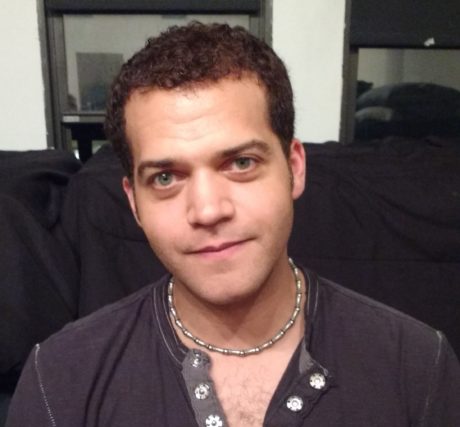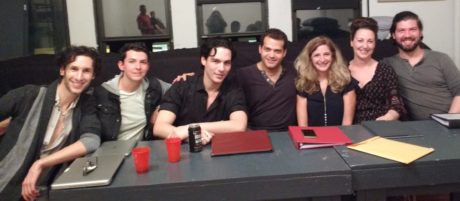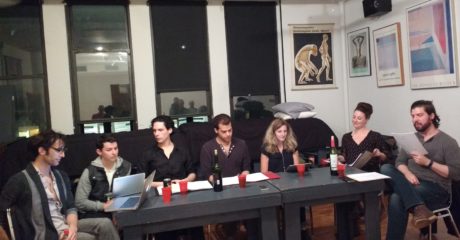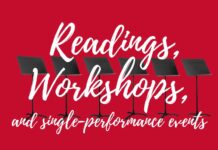Just back from a production of his musical GRINDR: The Opera in Florida, Erik Ransom organized a private developmental reading of his latest work Civil Blood (The Resurrection of Romeo) for an invitation-only audience. The new play, set in 1585 and 1982, is an inventive vampire sequel to Romeo and Juliet that combines the time-traveling characters with Shakespearean language and witty wordplays in iambic pentameter, well-researched references to the Bard’s canon, the Hapsburg dynasty, and the Reagan years, and important universal themes about captivity, individuality, love, and immortality.
Appropriately presented by The Living Playwrights’ Society on Friday the 13th, the reading featured a talented ensemble of six well-cast actors (Scott Lilly, Jax Jackson, Francesco Andolfi, Erik Ransom, Jamie Heinlein, and Colleen Corcoran, with stage directions by Daniel Żużałek), who delivered the undead characters’ development, accents, humor and passion to perfection. As with all of Ransom’s work, Civil Blood, even in its early stage, is uber-intelligent, lyrical and provocative, and fully engrossing.
I sat down with Erik before the reading, to discuss the play, its original style, and his vision of it for future full-stage productions.

Deb: Where did you get the idea for the story and its original combination of elements?
Erik: I always like to go into a project with a challenge, and for this one it was iambic pentameter and a verse play. As for the theme, a lot of ideas I had were thrown into a blender. I’d been thinking about doing a vampire play for a while, I’m obsessed with the Hapsburgs, and I’m interested in the concepts of beauty and femininity. I also wondered why no one has done a sequel to Romeo and Juliet. Okay, because they’re dead – so that’s where the vampires came in! Then I thought of the title Civil Blood, and I knew I had to do it.
You usually compose musicals. Why did you decide to approach Civil Blood as a play?
Yes, I did a one-act play in college, but this is the first full-length play I’ve written. I wasn’t sure about writing a play originally. I started a draft that was a musical, but the balance between verse and song didn’t sound right to me. I still have the idea that I could create a musical version of it if I wanted to in the future, but for now it feels right to me as a play.
How challenging was it to write this in iambic pentameter?
It was surprisingly easy, because my background and skillsets as a lyricist were immensely beneficial. Here, as with music, I’m working in a consistent pattern. And here the verse changes my voice; it makes me say things I normally wouldn’t say, in a way that is longer, more flowery, metaphorical, and descriptive, because of the pattern and lyricism of the verse. I’ve always found Shakespeare’s language to be very musical, so the style definitely worked for me. I’m also a little OCD, so I keep a pattern!
Aside from the entertainment value, what are the main messages of Civil Blood?
Like Romeo and Juliet, it’s mostly about love. It explores many different kinds of love, from requited and consensual to the realm of obsession to Romeo’s narcissism. We touch on issues of race, feminism, sexuality, and gender, contrasting the Elizabethan period with 1980s America.
Since Civil Blood is a work in development, have you made any major changes following its private reading in Philadelphia this past summer?
We also had a partial reading of the incomplete script in New York, prior to Philadelphia. Yes, based on feedback in the room and my own view of how I felt it played, I made some changes, so I’m curious to hear how they sound now. There were significant cuts to Act I, which takes place in 1585. Even though I’m writing in Elizabethan verse, it’s still for a contemporary audience, so some of the archaic language seemed to drag in comparison to the more current second act, which is set in the 20th century and has a faster pace. And Philadelphia-based Director Brenna Geffers, who attended the reading there, made some useful suggestions about the relationship between the Spanish Hapsburg Princess Catalina and her maid Mildred, which I incorporated to greater effect in this latest draft.
How do you envision the show on stage, in terms of design, scale, direction, and casting?
One of the things I love about playwriting is putting all of that in the hands of others. I wrote it for a small cast of six, so that should help in all areas of its production. I welcome different interpretations of the play, but I would like to see a literal version, with the Elizabethan characters in period costumes and the ‘80s in punk. I love being a part of the casting process, so I would like to be included in that. For Civil Blood I wrote some of the roles for particular actors: Catalina was written specifically for Colleen Corcoran; Francesco Andolfi, a passionate Italian, embodies Romeo for me; and I wrote the part of the Minstrel for Scott Lilly. All three of them were cast in at least two of the readings, and I couldn’t be happier with how perfect they are for their roles. Writing with an actor in mind helps me to find the voice of the character, and when I hear the lines being performed out loud, it leads me to make the necessary revisions. I should mention that we’re also fortunate to have Jax Jackson for this reading. Because transgender themes are so raw in this, it’s important to have a transgender actor in the cast. And Jamie Heinlein brings just the right touches of strength and humor to her two roles.

For someone who has never performed in a professional full-stage production of Shakespeare, you have an extraordinary comprehension of his themes, facility with his language, and empathy with his characters. Is it a dream of yours to do Shakespeare some day?
I would love to! Richard II is one of my dream roles; I’m drawn to epic themes and historical figures, especially flawed characters in power. Kathryn Warner, who just wrote a book on him (Richard II: A True King’s Fall), considered his portrayal by Shakespeare to be the most accurate. For me, the music of the language, especially for an opera or a musical performance, feels very gratifying – it feels like singing. My desire to perform Shakespeare is one of the main reasons I founded The Dead Playwrights’ Society.
Tell us about your two private reading groups, The Dead Playwrights’ Society and The Living Playwrights’ Society. Why did you found them, and what are their functions and benefits?
They were sprung out of a pool of talented actors I know who don’t always get the opportunities they deserve to play iconic dream roles. Here they do, at a table read, in a low-pressure environment, with alcohol! Some of the readings have resulted in the actors creating new audition monologues that display their strengths with the classics. In general, it gives us a better understanding of the work and a better feel for the characters when they’re read out loud with a group, instead of alone silently. I’ve included a series of Shakespeare’s history plays, works we don’t know as well, and even some of his contested writings. So what started out as a status message on Facebook, with several of my friends clicking Like and inviting others to join (some I only knew vaguely), grew into two groups doing regularly-scheduled readings.

Since GRINDR: The Opera had a successful run in Orlando, would you eventually be interested in taking Civil Blood on the road?
Yes, of course! I would love for it to be seen all over the world. It’s a very different show than GRINDR and I do think the audiences will be very different. Though they both play with a lot with broad humor about love and sexuality, it sounds very different in the Shakespearean language, with dirty jokes in Elizabethan slang! Also this show starts with a little recap of the crypt scene from Romeo and Juliet, so it brings people in with something familiar and classic.
What’s up next for you?
Next up is another private reading on Sunday, this time with The Dead Playwrights’ Society, of Shakespeare’s Henry VI, Part I. Then GRINDR goes to The Chicago Musical Theatre Festival in February 2018, and perhaps to a few other cities that I can’t yet announce, which have expressed an interest in producing it.
Thanks, Erik, for sharing your thoughts on the development of Civil Blood with us. After the excellent reading, I can’t wait to see it in a full-stage production!




